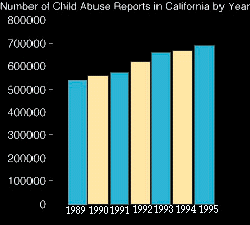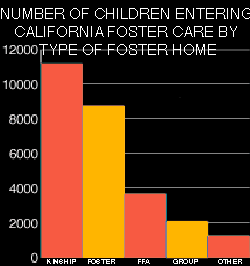| Why Christopher can't go home... Doris Jackson has her hands full. She is making her weekly visit to Children's Hospital Foster Care clinic in Oakland, where the walls are decorated with colorful pictures of Noah's ark, and the sound of children talking and laughing fills the hallways. In one arm she holds a crying one year old baby, Robert, and with her other she restrains two and a half year old Christopher, who delights in slamming the bright red door to the exam room over and over again. Ronald Busby, Jackson's baby-sitter, sits on another chair, calmly looking on. "Sir Nanny," as Jackson calls Busby, is going out to get a cup of coffee. "Go with him," she says and nudges Christopher. "You'll get some chips. Mmmm, you like chips." Christopher cries and won't leave his foster mom. Christopher and Robert are among the 500,000 children in the US. who are being raised by the foster system. In 1996, almost a million cases of child abuse and neglect were documented in this country. A portion of these kids get removed from their homes and sent into the system. In Alameda county there are about 4000 kids in the foster system. Jackson, 45, a slender woman with short wiry hair and a big lace bow on her head, is an Intensive Care Unit nurse at UCSF hospital. She works three twelve hour shifts so that she can spend the rest of the week caring for Christopher and Robert. While she is at work, Jackson hires Busby to watch them. Alameda county pays Jackson $887 a month for Robert and $900 for Christopher. The standard rate is $345 a month but Jackson gets an allowance for children with special needs. Out of this money, Jackson pays Busby $800 a month for baby-sitting. Christopher and Robert are among the luckier children in Alameda County's foster care system. Their foster mom is trained to deal with their unique medical conditions. Christopher is chubby and energetic, and smiles frequently . It's hard to tell that he was a crack baby, is blind on his left side, wears a special glass eye, and has no small intestine or bowel control. Christopher's problems, like many other children in foster care, stem from his motherís drug addiction. The court took Christopher from his mother and determined that, for his own good, he can't go home again, at least for now. His grandmother would like to raise him, but cannot accommodate Christopher's medical needs. Substance abuse is ranked along with homelessness and HIV infection as a major predictor of which children will end up in foster care. Louis Haight is a juvenile court judge in Contra Costa County. She says that 90% of the child dependency cases that come into her courtroom are drug related. "I don't read about the real underlying cause which is the use of illegal drugs," Haight says. "It's like almost, well, they are poor they use drugs. That is not what we see. I mean we see parents from nice homes, we see parents from bad environments. But the common cause in this county and in Alameda is methamphetamines and the use of cocaine. When they use it they do hideous things to their children." Despite his drug related health problems, Christopher is doing well. "Christopher is thriving so well because I took such good care of him. He had to eat a lot of small meals, because of his bowels," Jackson says. "I took him because he was medically fragile. I thought, I can work with that, because that's my thing, that's what I do. I can do this." |
|
|

